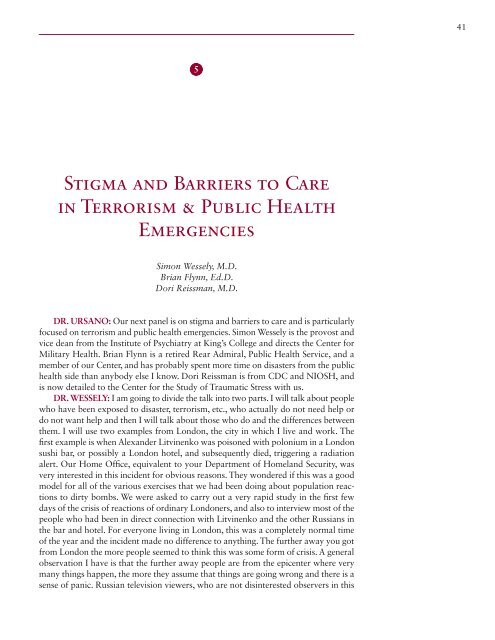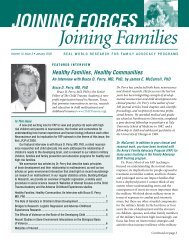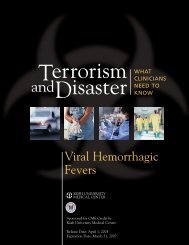stigma and barriers to care - Uniformed Services University of the ...
stigma and barriers to care - Uniformed Services University of the ...
stigma and barriers to care - Uniformed Services University of the ...
Create successful ePaper yourself
Turn your PDF publications into a flip-book with our unique Google optimized e-Paper software.
Stigma <strong>and</strong> Barriers <strong>to</strong> Care in Terrorism & Public Health Emergencies 41<br />
5<br />
Stigma <strong>and</strong> Barriers <strong>to</strong> Care<br />
in Terrorism & Public Health<br />
Emergencies<br />
Simon Wessely, M.D.<br />
Brian Flynn, Ed.D.<br />
Dori Reissman, M.D.<br />
DR. URSANO: Our next panel is on <strong>stigma</strong> <strong>and</strong> <strong>barriers</strong> <strong>to</strong> <strong>care</strong> <strong>and</strong> is particularly<br />
focused on terrorism <strong>and</strong> public health emergencies. Simon Wessely is <strong>the</strong> provost <strong>and</strong><br />
vice dean from <strong>the</strong> Institute <strong>of</strong> Psychiatry at King’s College <strong>and</strong> directs <strong>the</strong> Center for<br />
Military Health. Brian Flynn is a retired Rear Admiral, Public Health Service, <strong>and</strong> a<br />
member <strong>of</strong> our Center, <strong>and</strong> has probably spent more time on disasters from <strong>the</strong> public<br />
health side than anybody else I know. Dori Reissman is from CDC <strong>and</strong> NIOSH, <strong>and</strong><br />
is now detailed <strong>to</strong> <strong>the</strong> Center for <strong>the</strong> Study <strong>of</strong> Traumatic Stress with us.<br />
DR. WESSELY: I am going <strong>to</strong> divide <strong>the</strong> talk in<strong>to</strong> two parts. I will talk about people<br />
who have been exposed <strong>to</strong> disaster, terrorism, etc., who actually do not need help or<br />
do not want help <strong>and</strong> <strong>the</strong>n I will talk about those who do <strong>and</strong> <strong>the</strong> differences between<br />
<strong>the</strong>m. I will use two examples from London, <strong>the</strong> city in which I live <strong>and</strong> work. The<br />
first example is when Alex<strong>and</strong>er Litvinenko was poisoned with polonium in a London<br />
sushi bar, or possibly a London hotel, <strong>and</strong> subsequently died, triggering a radiation<br />
alert. Our Home Office, equivalent <strong>to</strong> your Department <strong>of</strong> Homel<strong>and</strong> Security, was<br />
very interested in this incident for obvious reasons. They wondered if this was a good<br />
model for all <strong>of</strong> <strong>the</strong> various exercises that we had been doing about population reactions<br />
<strong>to</strong> dirty bombs. We were asked <strong>to</strong> carry out a very rapid study in <strong>the</strong> first few<br />
days <strong>of</strong> <strong>the</strong> crisis <strong>of</strong> reactions <strong>of</strong> ordinary Londoners, <strong>and</strong> also <strong>to</strong> interview most <strong>of</strong> <strong>the</strong><br />
people who had been in direct connection with Litvinenko <strong>and</strong> <strong>the</strong> o<strong>the</strong>r Russians in<br />
<strong>the</strong> bar <strong>and</strong> hotel. For everyone living in London, this was a completely normal time<br />
<strong>of</strong> <strong>the</strong> year <strong>and</strong> <strong>the</strong> incident made no difference <strong>to</strong> anything. The fur<strong>the</strong>r away you got<br />
from London <strong>the</strong> more people seemed <strong>to</strong> think this was some form <strong>of</strong> crisis. A general<br />
observation I have is that <strong>the</strong> fur<strong>the</strong>r away people are from <strong>the</strong> epicenter where very<br />
many things happen, <strong>the</strong> more <strong>the</strong>y assume that things are going wrong <strong>and</strong> <strong>the</strong>re is a<br />
sense <strong>of</strong> panic. Russian television viewers, who are not disinterested observers in this




